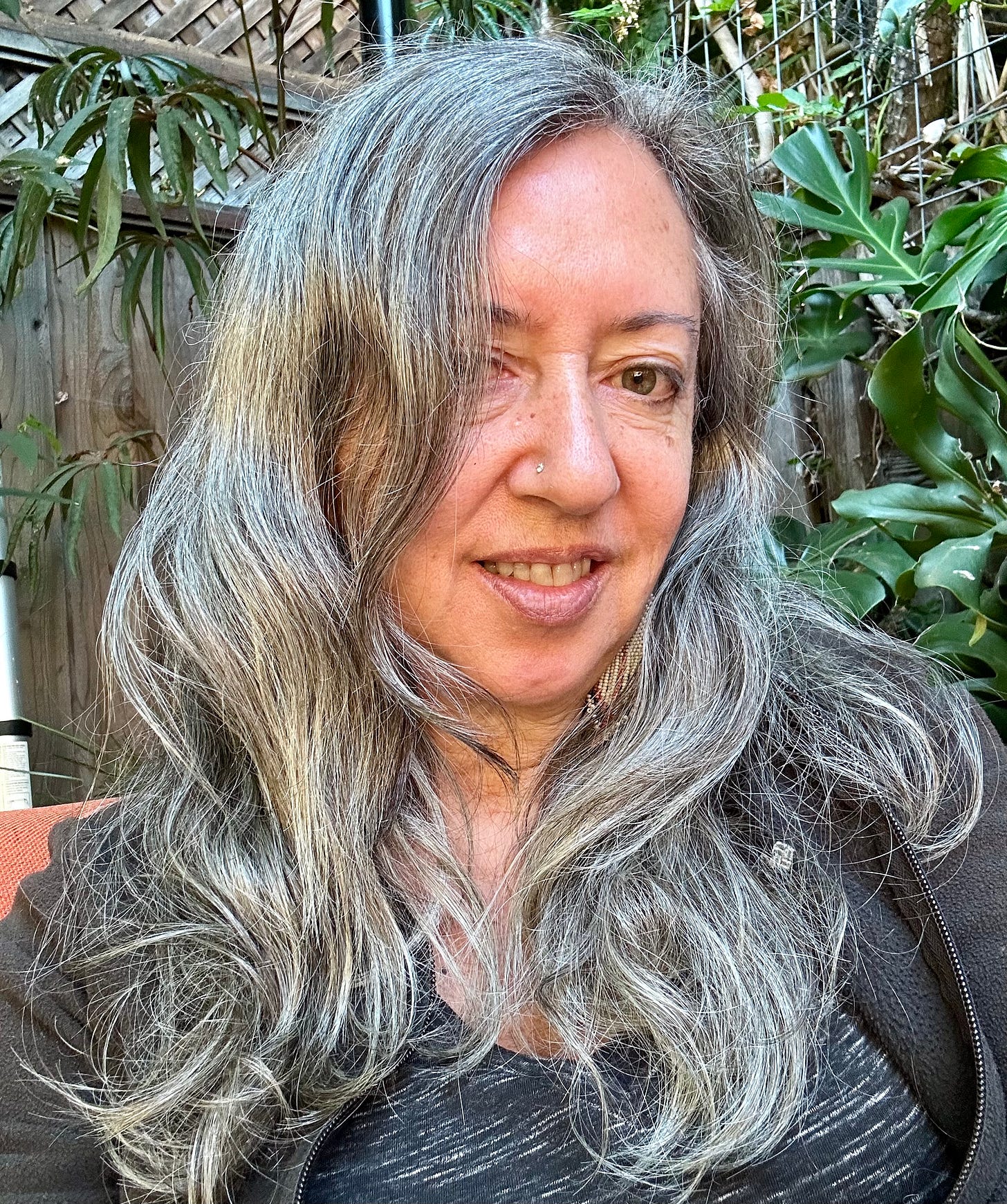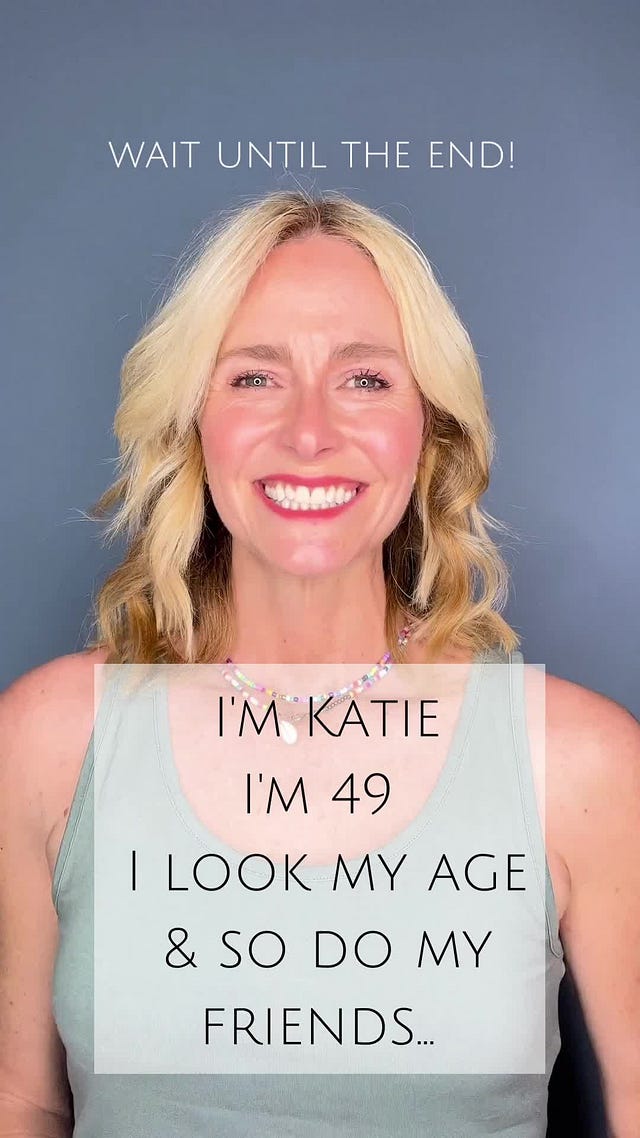
As I boarded a plane this summer, the flight attendant at the door complimented me on my hair and asked if its color was natural. She wasn’t the first to think my gray hair might be highlights, but I was surprised to get this reaction from someone belonging to that very coiffed and made up subset of humans that is flight attendants.
I admit I appreciated it, despite all the admonitions we get that our physical appearance isn’t what’s important — and despite the fact that I truly believe that. I also admit that I miss my dark hair and wish I had my mother’s hair genes; at 89, she has less gray hair than I do. I’m constantly surprised at how much more gray I have each year and still think of my hair as being dark brown.
I’ve never dyed my hair in my life, but that’s in part due to cheapness and laziness. Having to do it every six weeks? No thanks! Laziness has also led me to stop blow-drying my hair straight, despite its unruliness and despite my concerns about looking like an old hippie. Heck, maybe I am an old hippie — though the real ones were Boomers, not Flower Children like myself.
Here’s another confession: I miss the time when I didn’t “look my age” — when people thought I was much younger than I was. That time stretched through a lot of my life, at least into my early fifties. A co-worker’s jaw dropped when I told him I was 40. I enjoyed that kind of reaction. When I made a career change at 52, I relied on my younger looks to shield me from age discrimination. Was I right about that? I’ll never know, and the people who hired me certainly appreciated my experience. But I felt better knowing that I looked younger than I was.
Times have changed. Now, I “look my age.” No one expresses surprise when I tell them I’m 62.
Should it matter?
Of course we don’t want it to matter. But let’s face it: we’re visual creatures, and living in the society we live in, it’s hard not to want to look younger. We glorify youth, and big advertising bucks are spent telling us we should keep trying to look younger. It’s especially hard for women; Rafael gets to be a silver fox, while I’m … I don’t even know. Invisible. An aging, post-menopausal woman who’s gained more weight than she’d like and who misses her dark hair. Having just had a birthday, I’m feeling all the more aware of my age.
In the midst of these feelings, I was glad to stumble upon the viral #ILookMyAge social media campaign this summer. Launched in part by an apparel brand, it nevertheless became a powerful — though seemingly short-lived — social media phenomenon, generating over 4 million views in a week. Participation extended beyond Instagram, which I rarely frequent, and TikTok, which I’ve never signed up for, to LinkedIn, the more professional platform where I saw it.
The campaign generated a number of videos, including this one:

 Tiktok failed to load.
Tiktok failed to load.Enable 3rd party cookies or use another browser
What does it mean to look your age? And why do we need a campaign like this in 2023?
It’s been nearly 50 years since Gloria Steinem famously responded to a reporter who said she didn’t look 40, “This is what 40 looks like.” But we still have very skewed notions of what it means to look your age.
Looking your age can mean more than one thing. It can mean owning your age — not trying to look younger than you are or to represent yourself as younger. It can also mean that however you look is by definition how someone your age looks — whether you look younger or older than the average person who’s your age.
There are so many ways to look at any age.
But we don’t allow for that. Instead, we’re bombarded with countless images of people (especially women) looking youthful and perfect, setting impossible standards for how we should look throughout our lives. We’re exhorted to buy products that will help us achieve those impossible standards. It’s big business; the global anti-aging market was estimated at $60.42 billion in 2021 and is expected to grow to $119.6 billion by 2030.
How do we free ourselves from the grip of this anti-aging pressure? It isn’t easy — and as with so many isms, we’re not as far along in overcoming ageism as we should be in 2023. We’ve made some incremental progress since I was a young Flower Child, but not nearly enough. Ageism has held out as one of the last socially acceptable prejudices.
Countering this prejudice, little glimmers of progress are emerging here and there. Anti-ageism books, campaigns, and platforms are springing up like mushrooms in the dark; let’s hope they spread like mushrooms.
This Chair Rocks, a website and a book by the same name, proclaims, “Aging isn’t a problem to be solved.” What a concept! Its creator,
, also hosts a site called Yo, Is This Ageist? where you can ask her if “something you saw or heard or did is ageist.” Her work, which I recommend, has been gaining traction and recognition.Also gaining traction are “mature” models; even Lancôme hired back Isabella Rossellini 20 years after firing her in her early 40s for being “too old.” Of course, brands like these are still trying to sell us creams and potions to keep looking young, but at least we’re seeing some older models. Roles for older women actors in TV and movies are becoming more common, helping make older women more visible — most notably, Jane Fonda and Lily Tomlin in shows like “Grace and Frankie.” Meryl Streep also had a nice role as an older romantic interest (and potential murder suspect) who “looks her age” in “Only Murders in the Building.”
Rafael and I used to enjoy seeing the psychological transformations of participants in the reality show “What not to Wear,” with its acceptance of all body types. But I was always troubled by co-host Stacy London’s comments about “old lady sweaters” and what was “age-appropriate.” Now, even she has come around:
“I’m the person who used to be, like, that’s not age-appropriate,” she says, “And now, I’m like, fuck those rules.”
I’ve been there, too. When I turned 30, I wondered if I should stop wearing short skirts. Now, that seems absurd to me. Now, I wear whatever the hell I want.
That doesn’t mean I’m immune to the pressures of society. It doesn’t mean I’ve stopped missing my younger-looking self. It doesn’t mean it’s easy to divulge my age in public forums. But I’m getting more used to it.
Aging has its drawbacks, to be sure, and I don’t imagine anyone enjoys the increasing physical limitations. But aging can bestow numerous gifts, too: wisdom, clarity, and purpose, to name a few. Like our society, I’m not as far along as I’d like to be at this point. But like our society, I’ve made some progress. If that shows on my outside, so be it. I just hope my inside can keep up.





I went through a long phase of denying I was aging. But that denial probably aged me even more. Each little age spot and ache and squint when reading must be the universe reminding me, as gently as it can, that there's no real "victory" against aging (unless one dies young, and that seems to be not much of a victory). I'm still not entirely sure I want to "agree" with the universe on this, but the evidence sure looks compelling. "Your honor, I object! If I could just remind the court that I still believe I'm younger-ish..." To which the judge replies, "you make me laugh. Overruled!"
But as Ben notes in this thread, compassion may be the antidote to unacknowledged aging.
I'm the person who was madly in love with my former wife for the the first 5 years of our marriage.
Now I am in my 70's, still looking for that "special someone" and mostly finding women who look like my Grandmother. Not fair-absolutely, and completely absurd because I look like a Grandfather
to them. Holy revelations!! The entire upside-down insanity of it is that I now either try to avoid a mirror and especially avoid looking at my profile(in which I really look over-the -hill). And, of course,
even with a little wisdom thrown-in, inside I feel like the same 21yr. old with the exception of a creaky knee or ankle. And I say to myself, "Ben!- This woman, who looks like my Grandmother, is a person just like you and has thoughts and feelings, interests and loving relationships(hopefully), desires and the need to love and be loved! How can I judge her on the basis of her looks-and I feel shame. And then I realize that I am afraid of being old and undesirable, unloveable and seen as a Grandfather. So-my rejection of perfectly, possibly wonderful others in female form is rejection of myself-and I remain alone as long as I remain in this prison of self-deception.
Ben